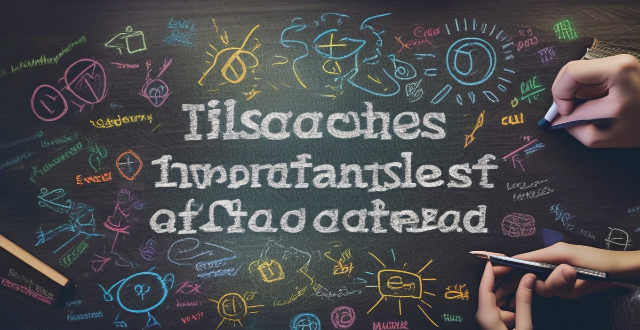This text discusses the importance of training teachers in special education needs (SEN) to ensure all students receive an appropriate education. It suggests a comprehensive approach that includes understanding the importance of SEN, foundational knowledge and skills, practical application, emotional and behavioral support, communication and partnership, and continuous professional development. The text emphasizes the need for ongoing training, reflective practice, and collaboration with professionals from related fields to provide holistic support for students with SEN.

The Best Approach for Training Teachers in Special Education Needs
Introduction
Training teachers in special education needs (SEN) is a crucial aspect of ensuring that all students receive an appropriate education. This training should be comprehensive, ongoing, and tailored to the specific needs of both the teachers and the students they serve. Here's a detailed approach to effectively train teachers in SEN:
Understanding the Importance of Special Education Needs
- Awareness and Sensitivity: Teachers must first understand the importance of addressing SEN. They need to develop awareness and sensitivity towards the challenges faced by students with disabilities or learning difficulties.
- Inclusive Education Philosophy: Emphasize the philosophy of inclusive education, where every student, regardless of their abilities, has the right to quality education.
Foundational Knowledge and Skills
- Theoretical Foundations: Provide a solid theoretical foundation in special education, including different types of disabilities, learning styles, and strategies to support diverse learners.
- Assessment Techniques: Train teachers in assessment techniques to identify students with SEN accurately and promptly.
- Curriculum Adaptation: Teach skills for adapting the curriculum to meet the needs of students with SEN without watering down the quality of education.
Practical Application
- Individualized Education Programs (IEPs): Guide teachers in creating and implementing IEPs, which are legal documents outlining the educational plan for a student with SEN.
- Differentiated Instruction: Educate teachers on differentiated instruction methods to cater to the varying needs of their students.
- Collaborative Teaching: Encourage collaboration between general education teachers and special education teachers to provide a unified approach to student support.
Emotional and Behavioral Support
- Positive Behavioral Interventions: Train teachers in positive behavioral interventions and supports (PBIS) to manage behavior effectively and promote a positive classroom environment.
- Mental Health Awareness: Educate teachers about mental health issues that may affect students with SEN, such as anxiety or depression, and strategies to support these students.
Communication and Partnership
- Parental Involvement: Emphasize the importance of communication with parents and guardians to foster partnerships that support the student's educational journey.
- Professional Collaboration: Encourage networking with professionals from related fields, such as speech therapists or occupational therapists, to provide a holistic support system for students.
Continuous Professional Development
- Ongoing Training: Make sure that SEN training is not a one-time event but a continuous process with regular updates and advancements in the field.
- Reflective Practice: Encourage teachers to engage in reflective practice, evaluating their teaching strategies and seeking feedback to continuously improve their approach to SEN.
Conclusion
Training teachers in special education needs requires a multifaceted approach that encompasses theoretical knowledge, practical skills, emotional support, and continuous professional development. By adopting this comprehensive strategy, educators can better support students with SEN, ensuring they receive an equitable and effective education.